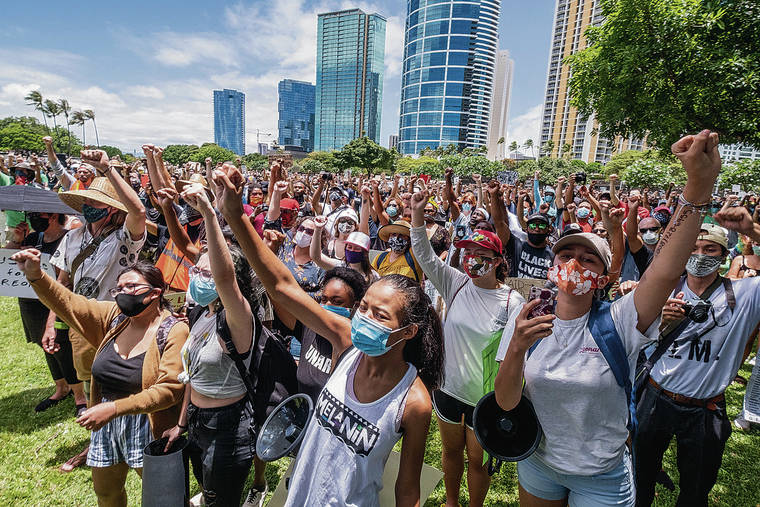
Mahalo for supporting Honolulu Star-Advertiser. Enjoy this free story!
On June 6, around 10,000 people peacefully marched from Ala Moana Beach Park to the state Capitol to support Black Lives Matter and protest police violence. The event was organized and “dominated” by young people, according to local reports. Hawaii for Black Lives, the lead organizing group, was formed by students at Radford High School and other local schools after the death of George Floyd.
Across the county, young people are rising up and fighting for a variety of issues — racial and gender equality, climate justice and health equity, to name a few. Led by youth organizers, students are participating in volunteer work days, starting sustainability clubs on campus, and testifying before elected officials. To express our voices, we’ve marched against guns, police violence and the negative effects of climate change.
Youth want to see policies changed around issues we care about, but we lack the political clout and connections of other age groups. Ageist barriers in our government prevent us from being civically engaged. One way to authentically elevate our voices and involve us in the policy- making process is to create a city youth commission — an appointed body of young people, ages 14-24, that provides valuable feedback to city leadership.
In San Francisco, the youth commission is championing the Vote16 measure, which, if passed this fall, would make the Golden City the first major municipality to allow youth ages 16 and 17 the right to vote in local elections. Many city-run youth commissions are using social media to share COVID-19 resources, mental health tips and remote-learning strategies. In Sacramento, the youth commission may soon be helping to decide how the city allocates nearly $90 million in coronavirus stimulus funds.
In late 2019, Honolulu Councilmember Tommy Waters presented Resolution 19-329, proposing that the city establish a youth commission composed of 14 students ages 14-24. If passed by the full Council this month, Honolulu voters will have a chance to support this City Charter amendment on the 2020 general election ballot.
A Honolulu youth commission would build upon ongoing efforts to incorporate cross-generational perspectives. In 2018, the Caldwell administration signed Bill 54 into law, committing to an age-friendly Honolulu. In addition to supporting older adults, an age-friendly city meets the needs and interests of youth.
The 2020 election will also force a political shakeup at the city, so it’s important that incoming leadership share inclusive values around youth involvement; it could make the difference for who gets the support of the nearly 14,000 registered Honolulu voters under 30 (based on the 2010 Census). So far, several mayoral candidates are openly supporting youth involvement.
Critics may think that youths lack life and professional experience, are immature and would rather stay home to make TikTok videos. It’s true that we need to vote more. Hawaii has one of the worst young voter turnouts in the U.S.: our state’s youth turnout was a mere 30% in the 2012 general election, well below the national average of 45%. But youths are stepping up in our communities, creating new programs and changing policies.
The student-led March For Our Lives campaign successfully enacted stricter gun control policies, both at the state and federal levels. Right here in Honolulu, our City Council recently passed Bill 40, one of the most comprehensive single-use plastics ban in the country, thanks in part to the leadership of 17-year-old Dyson Chee and the Hawaii Youth Climate Coalition.
These young people’s victories give us hope and motivate us to do more. But our generation cannot do it alone. People of all ages can be inspired by young leaders such as Tehani Malterre, who, at 18, became the youngest member of an Oahu neighborhood board.
Now, more than ever before, Honolulu is poised to become a city that is truly age-friendly.
Colby Takeda is senior manager with Blue Zones Project, a community health and well-being initiative; Joseph Newmann is a Kailua resident and a rising junior at Seattle University.
"hear" - Google News
July 05, 2020 at 05:05PM
https://ift.tt/2VNN2cs
Column: Youth power: Age-friendly city needs to hear from people of all ages - Honolulu Star-Advertiser
"hear" - Google News
https://ift.tt/2KTiH6k
https://ift.tt/2Wh3f9n
Bagikan Berita Ini














0 Response to "Column: Youth power: Age-friendly city needs to hear from people of all ages - Honolulu Star-Advertiser"
Post a Comment